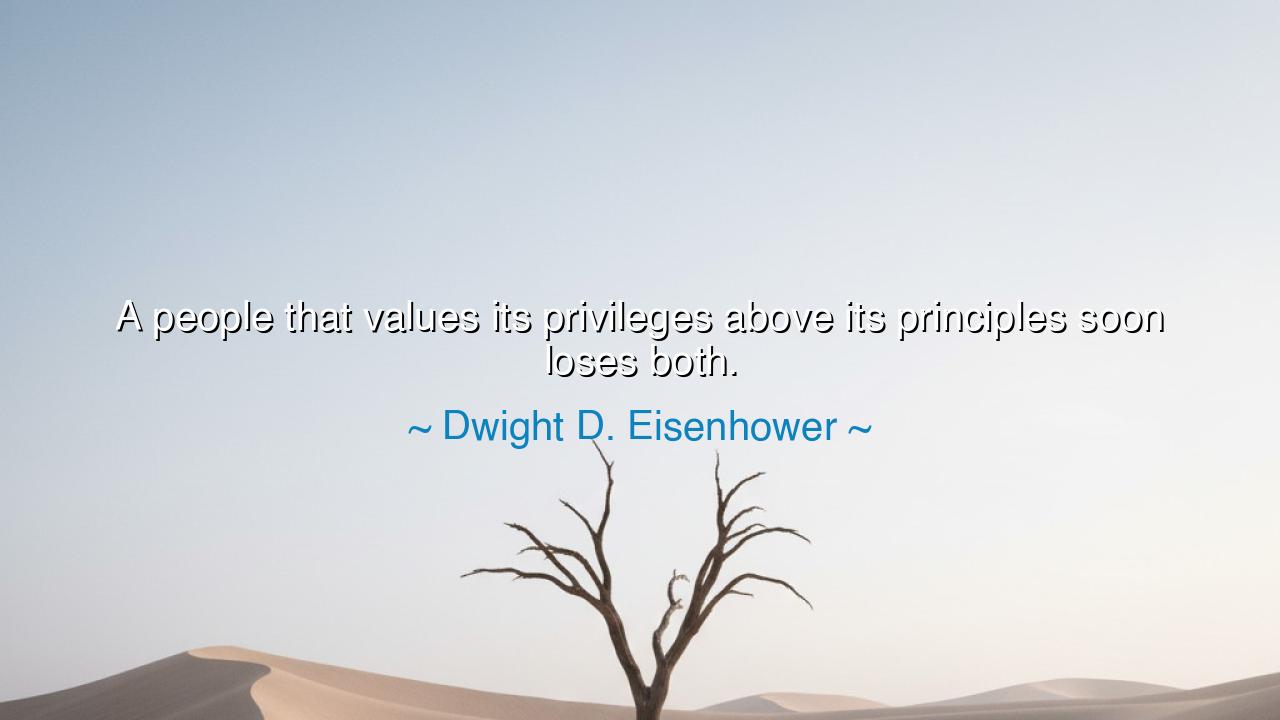
A people that values its privileges above its principles soon






In the annals of history, there have been countless civilizations, great and small, that have risen to glory only to fall into ruin. Their demise was often not caused by external forces, but by the internal rot that grew when they abandoned the principles that once made them strong. The words of Dwight D. Eisenhower, “A people that values its privileges above its principles soon loses both,” ring with the wisdom of ages. These words speak not only to the importance of the values that sustain us but also to the peril that lies in placing self-interest and comfort above the very ideals that form the foundation of a just and prosperous society.
At the heart of Eisenhower’s insight is the concept of balance—the balance between enjoying the fruits of prosperity and remaining true to the moral compass that guides a nation. A society that places too much emphasis on the privileges of its people—whether those privileges are wealth, power, or comfort—begins to lose sight of the principles that made such privileges possible in the first place. The moment privilege becomes the primary pursuit, a society begins to drift from its founding ideals of justice, equality, and human dignity. It becomes a society that values possession over purpose, and the result is the erosion of the very foundations that support its prosperity.
This truth is evident in the rise and fall of the great civilizations of the past. Consider the Roman Empire, a civilization that once stood at the pinnacle of human achievement. Rome was founded on principles of law, order, and virtue. The early Romans were guided by a sense of duty, of public service, and of a shared vision for the future. But as Rome grew, so too did its privileges. The empire’s elite classes, driven by luxury and self-interest, began to value their privileges above the principles that had first brought them to power. They grew complacent, and the spirit of civic duty that once bound the Roman people began to fade. As they valued wealth and power more than the good of the state, they became susceptible to corruption, decadence, and moral decay. In the end, Rome fell, not from external invasion, but from the internal rot that comes from the abandonment of principles in favor of privileges.
The same lesson can be seen in the more recent history of the French Revolution. The French people rose up against an oppressive monarchy, seeking liberty, equality, and fraternity—principles that reflected their desire for justice and a society based on the common good. However, as the revolution progressed, the privileges of the revolutionaries themselves became more important than the principles of the revolution. The desire for power and control overshadowed the ideals of freedom and justice, leading to the Reign of Terror, where many who had once fought for liberty became the very tyrants they had sought to overthrow. In their pursuit of privilege, they lost the very principles that had originally inspired their cause, and their society plunged into chaos.
Today, we stand at a crossroads similar to the ones faced by Rome and France. Modern society has created a world of unparalleled privilege—unprecedented access to wealth, technology, and comfort. Yet, with these privileges come dangers. When a people places its desire for material gain, personal comfort, and status above the fundamental principles of equality, justice, and human dignity, it is not long before both the privileges and the principles begin to erode. We live in a time where wealth is often seen as the ultimate measure of success, and where self-interest has overtaken the collective good. Eisenhower’s words are a warning: the more we value our own comforts and privileges, the more we risk losing the principles that make our society strong.
The lesson is clear, and the call to action is urgent: we must remember that the true wealth of any society lies not in its privileges but in its principles. We must protect the ideals of equality, justice, and human dignity—for these are the principles that allow society to flourish. We must strive to create a society where the pursuit of privileges does not overshadow the greater good of the many. As individuals, we must seek to balance our personal ambitions with the well-being of our communities and our world. It is not the accumulation of wealth or the pursuit of power that will make us strong, but our ability to live by the principles of justice, compassion, and shared responsibility.
In the end, the lesson of Eisenhower’s wisdom is this: a society that values privileges above principles is a society on the path to destruction. Let us guard our principles fiercely, for they are the true foundation of all that is good, noble, and enduring in our lives. Only by living according to these principles, by placing the collective good above self-interest, can we ensure that both our privileges and our principles endure for generations to come.






AAdministratorAdministrator
Welcome, honored guests. Please leave a comment, we will respond soon